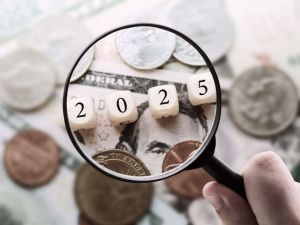After a year that’s been filled with difficulty and uncertainty, we’re all looking to 2021 to bring better things. We can’t control the situation with Covid-19 and we certainly can’t control the economic consequences, but we can get a handle on our own personal finances to best place ourselves for success and security going forward.
So, after waving goodbye to 2020, let’s make sound financial management our top new year’s resolution. To help, we’ve put together a list of things you can do to assess your financial situation, take steps to improve it and plan for the long term effectively.
Create a regular investment plan
The easiest way to save and invest money for the future is to make regular contributions. Once you’ve cleared any existing debts and ensured you have a substantial rainy day fund (we’ll go into more detail about this below), settle on a monthly amount you can comfortably commit to your investments.
Rather than attempting to time the markets with a lump sum investment – a difficult and potentially costly way to invest – it can pay to take advantage of a risk-adjusted approach, often called pound cost averaging. This little and often approach prevents investors from trading on sentiment and smooths out the prices of financial assets over time.
By continuously investing, savers can avoid missing out on the best days in the market, without committing all of their capital at once. Depending on what you’re saving for – retirement, a new home, a holiday or, simply, financial security – regular investing allows you to better estimate what your pot will look like in the years or decades to come.
For an idea of how powerful pound cost averaging can be, the chart above follows three hypothetical investment accounts being regularly topped up by £100, £300 and £500 respectively. Modelling shows that with a little and often investment approach, savers can build up significant savings over time. Make 2021 the year you get serious about saving.
Focus on clearing existing debts
Before you start putting money away for the future, it’s important to make sure the past isn’t costing you. The most judicious first step you can take is to pay off any high-interest debts you have. Whether it’s loan payments or credit card debt, investing elsewhere before paying these off is a counterproductive way to save.
The priority of payments should be directly proportionate to the interest rate you are paying, and the debts should be paid off in the same order. For instance, credit card bills are usually more expensive and attract a much higher rate of interest than mortgages – pay these off first. This way, you save on costly monthly interest payments and can manage your finances more clearly. The decision to pay off debts rather than saving should be made after comparing the interest rates being paid on loans and the interest earned on savings accounts and deciding accordingly.
Review your existing investments
One of the most important elements of financial housekeeping is the regular analysis of any existing investments you have. Whether you’ve invested money yourself or entrusted a wealth manager to do it on your behalf, ensuring you’re not overpaying on fees or underperforming in returns can make a huge difference.
Without ongoing investment advice or regular check-ins, it’s common for investors to lose track of their various investments. A lot like bank accounts, people are often unaware that they could be getting a better deal or service elsewhere – you don’t have to check around for improvements every month, but once a year or so it can be beneficial to do some research.
Another step you may want to take is the consolidation of your investments into one, manageable pot. If you have investments held with various providers, the chances are you’re paying more in fees than you need to be and you could also be wildly underperforming in some areas.
In 2021, take the time to gather your investments in one place for transparency, performance and, crucially, for lower fees. At Moneyfarm, for example, the fees our investors pay go down the more they invest or make with us. This means that, with one simple transfer, a Moneyfarm investor could lower the overall fees they pay on their investment portfolio significantly. It goes without saying that, the sooner you can consolidate your investments, the better.
Build a safety net
If 2020 taught us anything, it’s that external influences on our finances can be unpredictable. The uncertainty brought about by Covid-19 left a lot of people without work or earning only a percentage of what they did before the pandemic. This not only highlights the importance of putting money away for the future but having a buffer in place for short term issues.
As a rule of thumb, this kind of safety net should cover around three months of your living expenses – this is something that you can build up over time. A pandemic is a special case, but issues like car or boiler breakdowns, a temporary loss of income, or medical bills can be stressful without this safety net in place. With the ability to support yourself for a few months, you should avoid any truly nasty situations going forward.
Of course, many people will have three months worth of living expenses saved in the form of investments. For this to be effective, though, this cash needs to be immediately accessible should you need it, preferably from within a low-risk portfolio. At Moneyfarm, our Stocks and Shares ISA comes with the ability to easily and quickly withdraw cash, whether you need it to pay off an unexpected bill or you want to supplement spending on a long trip.





